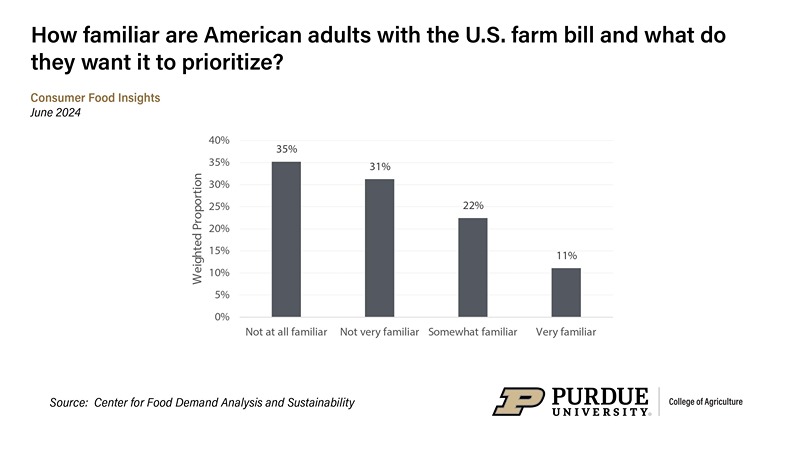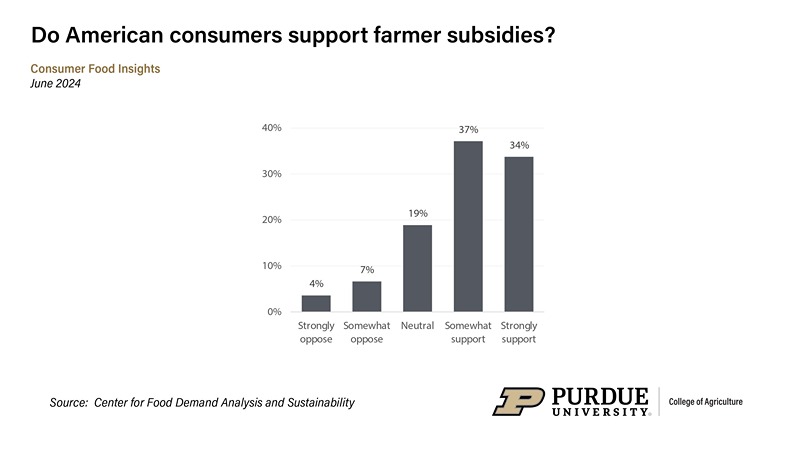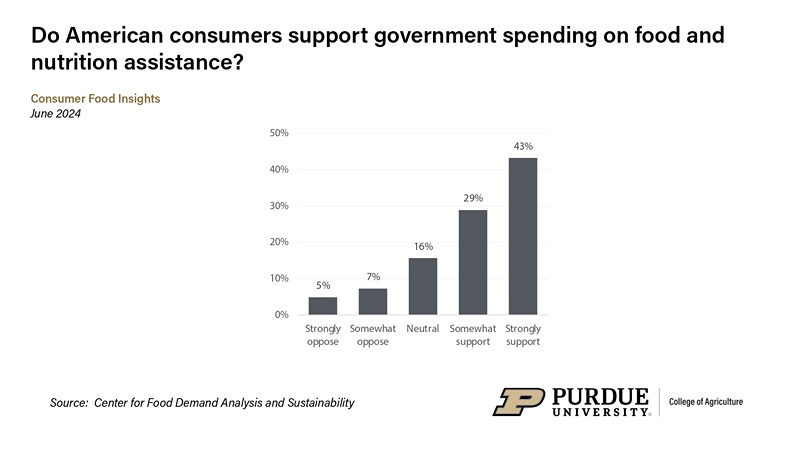The new Consumer Food Insights from Purdue explores consumer attitudes toward the U.S. farm bill
Bill contains provisions that receive bipartisan public support
The general public has limited knowledge of the U.S. farm bill that politicians are debating on Capitol Hill, according to the June 2024 Consumer Food Insights (CFI) Report.
The survey-based report out of Purdue University’s Center for Food Demand Analysis and Sustainability (CFDAS) assesses food spending, consumer satisfaction and values, support of agricultural and food policies, and trust in information sources. Purdue experts conducted and evaluated the survey, which included 1,200 consumers across the U.S
“Around one-third of American adults have never heard of the bill, while a similar proportion has heard of the bill but do not know what programs it supports,” said the report’s lead author, Joseph Balagtas, professor of agricultural economics at Purdue and director of CFDAS. “The farm bill encompasses hundreds of millions of dollars and touches every part of the food system.”
New survey questions last month explored consumer attitudes toward the farm bill, which the CFI team broke down by self-reported political ideology: liberal, moderate or conservative. The survey asked respondents to rank six broad policy areas aligned with the CFI’s sustainable food purchasing (SFP) index subindicators in order from most to least prioritized.
The results reveal some similarities and some differences between what consumers want in the farm bill and what they value in their own food consumption.
 Consumer familiarity with the farm bill, Jun. 2024
Consumer familiarity with the farm bill, Jun. 2024 “Our data show that consumers consistently rank taste, affordability and nutrition as the most important values when they shop for groceries. When we asked them to rank their priorities for the farm bill, affordability/economic sustainability and nutrition ranked high, as well,” Balagtas said. “But taste was not a consumer priority for the farm bill. And while consumers do not rank environmental sustainability as an important value for their own food shopping, they do rank it highly as a priority for the farm bill.”
Consumers may hold certain beliefs, like that the climate and the environment are important to address at the policy level, he said. But their individual purchasing behavior might not reflect the same sentiment as their decisions that are guided more by taste and affordability.
Two key components of the farm bill — farm subsidies and government spending on food and nutrition assistance — are heavily debated topics in the political world. Even so, most American adults (about 70%) support both farm subsidies (which include reduced crop insurance premiums, price support and conservation incentives) and food and nutrition assistance spending such as Supplemental Nutrition Assistance Program (SNAP) benefits.
 Consumer support for government spending
on farmer subsidies, Jun. 2024
Consumer support for government spending
on farmer subsidies, Jun. 2024 “When breaking down the results by self-identified political ideology, we see that support is bipartisan,” Balagtas said. “The majority of liberals, moderates and conservatives are in support of both farm subsidies and federal nutrition assistance.”
In the previous month, there were no major changes in food spending and inflation expectations or estimates. When sorting inflation expectations and estimates by political ideology from June 2022 to June 2024, however, differences arise.
Despite a downward trend in the consumer inflation estimates and expectations over time, those with liberal views have been more likely to estimate and predict a lower level of food inflation than moderate and conservative consumers. In June 2024, conservative consumers estimated that food prices had gone up almost twice as much as what liberal consumers estimate.
“Given that inflation is a common talking point in political discussions and can be a polarizing issue, it will be worth revisiting inflation expectations and monitoring food prices in the months after the upcoming 2024 U.S. presidential election,” said Elijah Bryant, a survey research analyst at CFDAS and one of the co-authors of the report. “This may provide further insight into whether political leanings influence these estimates.”
Food insecurity rose slightly to 13% in June. The reported rate of SNAP has been higher on average among liberals (20%) compared to moderates (17%) and conservatives (13%), according to the last 30 months of data.
 Consumer support for government spending
of food and nutrition assistance, Jun. 2024
Consumer support for government spending
of food and nutrition assistance, Jun. 2024 “The correlation between SNAP use and political leanings is in line with the degree of support these three groups show for government spending on food and nutrition assistance,” Bryant said.
The SFP index rose two points, to 72, from March 2024. Americans continue to score higher for taste, economics and security sustainability, and relatively low on social and environmental sustainability.
“We see some differences in food sustainability scores across political affiliations,” Bryant said. “Liberals on average have higher SFP scores than moderates and conservatives, driven largely by higher scores in environmental, social and nutritional sustainability.”
Eating a vegetarian or vegan diet is more common among liberal consumers. The rate of vegetarianism or veganism among this group is around twice as high as it is among moderate and conservative consumers.
Liberal consumers also report choosing unconventional food items more often than moderate and conservative consumers. Such items include cage-free eggs, plant-based proteins and organic foods.
“However, when it comes to recycling and reducing waste, we see similarities among consumers of all political views,” Bryant said.
“Understandably, we see some differences in what consumers believe about the food system based on their political leanings,” Bryant said. This especially applies to the level of agreement with statements about the link between the food system and the environment.
A majority of liberal consumers believe eating less meat is better for the environment (70%) compared to only 31% of conservative consumers. Similarly, 71% of liberals think agriculture is a significant contributor to climate change relative to 29% of conservatives.
“However, most consumers agree that local food is better for the environment, regardless of political leanings,” Bryant said.
The Center for Food Demand Analysis and Sustainability is part of Purdue’s Next Moves in agriculture and food systems and uses innovative data analysis shared through user-friendly platforms to improve the food system. In addition to the Consumer Food Insights Report, the center offers a portfolio of online dashboards.






